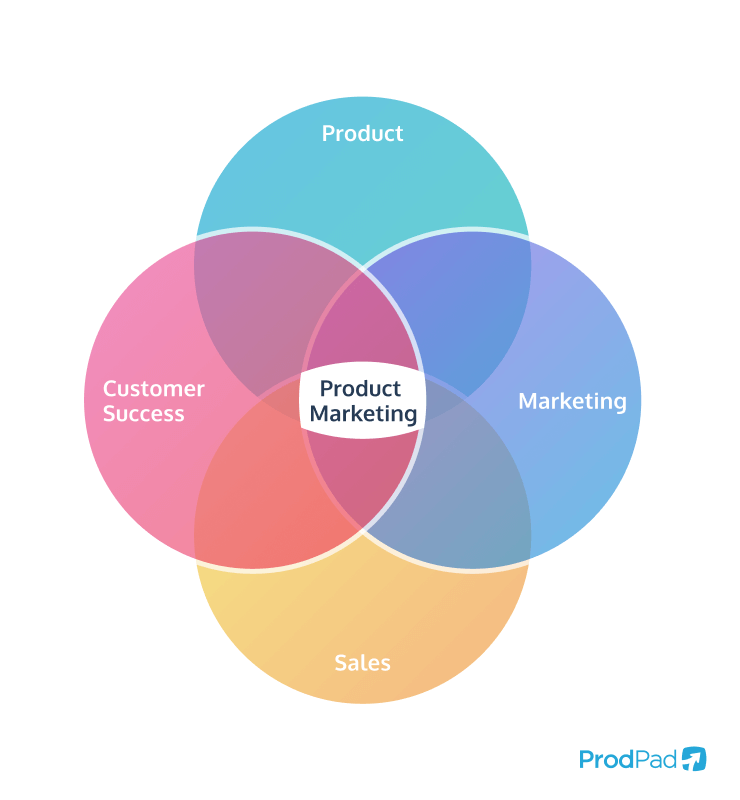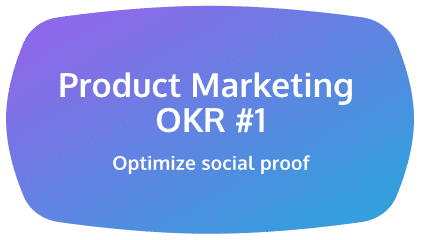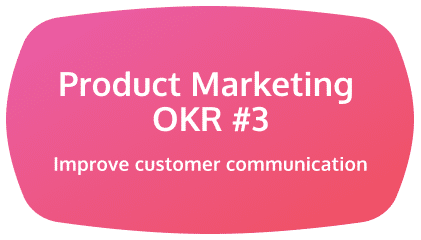Product Marketing Manager
What is a Product Marketing Manager?
A Product Marketing Manager is the person who’s sharing your product with the world. They’re the driving force behind getting your product in front of your target audience, making the product look compelling, exciting, and useful in order to drive acquisition to your offering.
A Product Marketing Manager is like a town crier – but instead of shouting in the street of a medieval English village, they’re sharing the story of your product to millions through various marketing channels. To do this, Product Marketing Managers need a deep understanding of the product they’re trying to promote, the audience they’re trying to promote to, and the competitors they’re promoting against.
Here’s how April Dunford, an expert in Product Marketing and Product Positioning, defines the Product Marketing Manager role:
“Product Marketers are the people responsible for being able to deeply understand and therefore articulate what is different and better and remarkable about your offering to your target people.
You have to deeply understand the market that you’re in, you have to deeply understand the competitors and the competitor’s capabilities, and then you have to deeply understand what’s your secret sauce versus those other folks. So, why are you different and special and amazing?”
April Dunford, Product Marketing & Product Positioning Expert
Source: April Dunford | What’s your definition of Product Marketing?
As a PM behind an amazing product, you’re already aware of how good your product is, right? You’ve seen it in action, built it to meet all your customer’s pain points, have all the evidence, and KNOW it can do the business. Not only that, but your internal team is behind it, thinking it’s the best thing since sliced bread.
But, your potential customers, they’re none-the-wiser. They have no idea about the potential of your product. Well, the Product Marketing Manager fills this gap, letting your target customers know who you are, what you do, and why they should choose your tool.
Product Marketing Managers (PPMs) are the product’s voice in the marketplace, and the market’s voice within the company, reporting on customer needs and the market intelligence they acquire. They ensure your product messaging resonates with the target audience while driving alignment between Product, Sales, and Marketing Teams.
What does a Product Marketing Manager do?
Product Marketing Managers have A LOT to do, and crucially, a lot of different things that influence and affect multiple areas of a business. They’re multitaskers, bridging gaps between teams, markets, and customers.
A PPM isn’t confined to their own little marketing world. That would make their job impossible. Product Marketing Managers touch multiple parts of the organization, ensuring smooth coordination between Customer Success, Sales, Product, and the rest of Marketing. They can’t just sit in a dark corner and crack on, oblivious to everyone else.
No, Product Marketing sits in the middle of multiple functions, having a hand in them all. They don’t just have multiple fingers in multiple pies, they’re practically wearing the pies as gloves.

So how does a Product Marketing Manager affect these four areas? What are they doing in their day-to-day that impacts these functional areas within a company?
Here’s a quick breakdown of the type of work a Product Marketing Manager will do, and why that work is so important for all of these departments.
How Product Marketing Managers work with Customer Success
Product Marketing can be a huge aid for Customer Success. With their eye on the wider market, PMMs can give CS a heads up on new trends, challenges or expectations that are emerging, and prepare them to communicate solutions and keep customers engaged. The insight gained from measuring and tracking the market and their understanding of the user journey allows them to anticipate challenges, communicate solutions, and keep customers engaged long-term.
PMMs support Customer Success by creating resources and communications that ensure users feel empowered and informed. Their contributions build stronger customer relationships and drive loyalty. Some specific Customer Success tasks include:
- Crafting product updates like release notes to keep users informed about new features.
- Building and maintaining a help center, ensuring resources are easily accessible.
- Creating training materials and tutorials that empower users to maximize product value.
- Designing customer engagement campaigns to prevent customer churn and foster deeper adoption.
How Product Marketing Managers work with Sales
Sales teams rely on PMMs to provide the tools and insights they need to convert leads into loyal customers. Product Marketing loads Sales with vital information about potential customers so that they are better equipped and informed to drive growth.
A PPM will be responsible for creating all sales collateral – things like info sheets, one-pagers, and even presentations – that include messaging that resonates with prospects. Some other ways Product Marketing helps Sales include:
- Creating pre-recorded product demos and helping craft scripts for Sales demos
- Gathering case studies and testimonials to build credibility and win trust.
- Managing product communication and training for Sales Teams, keeping everyone updated on the latest developments.
How Product Marketing Managers work with Marketing
PPMs are heavily involved in the marketing function. It’s kind of in the name. Product Marketing Managers sit at the intersection of marketing strategy and execution, influencing the marketing plan, how your product is positioned in the market, and how users move through marketing funnels.
Product Marketing Managers are influential in how a product is launched to the masses, deciding on the best channels and messaging to promote user activation. Some key marketing tasks a Product Marketing Manager will do include:
- Defining and championing user personas, aligning Product and Marketing around target audiences.
- Shaping product positioning and crafting messaging that differentiates your product.
- Fueling marketing programs with customer insights and data-driven strategies.
- Designing upsell and cross-sell campaigns to increase customer lifetime value.
- Creating retention strategies to prevent churn and foster advocacy, including referral programs and external reviews.
How Product Marketing Managers work with Product
Would you look at that? Product is also in the name of a Product Marketing Manager.
PMMs are the voice of the customer within the Product Team, ensuring that what the product development team works on aligns with user needs and market trends. They’re pivotal in influencing the product roadmap, offering key market and customer insights that help Product Managers prioritize features that address pain points, and then refine how those features are communicated.
By tracking user behavior and analyzing the competitive landscape, PMMs ensure that products stay relevant and valuable. Key product-related tasks performed by a Product Marketing manager include:
- Gathering and advocating for customer feedback to help Product Managers make informed product decisions.
- Conducting competitive analysis to identify opportunities for differentiation.
- Refining in-app messaging and positioning to emphasize the product’s core benefits.
- Analyzing user journeys to identify and address bottlenecks.
- Supporting successful product launches with go-to-market strategies that increase adoption and engagement.
What are the key responsibilities of a Product Marketing Manager?
As made clear in the previous section, there’s a helluva lot of things a Product Marketing Manager can be getting up to. That said, let’s dust off the fluff and check out the core responsibilities of the role, the main pillars of what Product Marketing Managers are here to do.
Think of the following as the core responsibilities of a Product Marketing Manager. If what we covered in the previous section are the day-to-day tasks, these are the overarching responsibilities.
Here’s a breakdown of the essential core responsibilities that you’ll likely see in a Product Marketing Manager job description:
1. Market and competitor intelligence
A PMM needs to know the competitive landscape like the back of their hand. This is a core expectation of the role.
This involves analyzing competitor products, pricing, positioning, and go-to-market strategies. By identifying gaps and opportunities, PMMs ensure their product stands out in their marketing efforts.
For example, a PPM can use their market intelligence to discover that a competitor’s feature is overhyped. From this, they can create messaging that highlights their own product’s superior capabilities.
Beyond products, they also track broader market trends to anticipate shifts in customer needs or industry standards, keeping the company ahead of the curve.
2. Customer insight
Understanding the customer is at the heart of product marketing. PMMs gather insights through customer interviews, surveys, and data analysis to uncover pain points, preferences, and behaviors. These insights guide product development, messaging, and marketing strategies.
A Product Marketing Manager is like the translator between the Product Team and their users, making sense of what users want while also putting out messaging to meet their needs. As Tamara Grominsky, a Product Marketing expert, puts it:
“Product Marketing is the voice of the product to the market and the voice of the market back to the product.
…It’s a two-way street, and we need to be traffic-controlling both sides of the street”
Tamara Grominsky, Product Marketing expert & consultant
Source: From Michelin Stars to Marketing Stars: Product Marketing Lessons from Tamara Grominsky
So, Product Marketing Managers get the messaging of the product out there to the masses but also bring the messaging from the masses back to the Product Team.
In action, this can be something like a PPM getting feedback that customers struggle with user onboarding. From this, they may advocate for clearer guides and education to meet the needs of these users and improve customer satisfaction and thus, stickiness.
3. Positioning and messaging
Crafting the right narrative is an essential part of being a Product Marketing Manager. A PPM needs to be able to take complex product features and translate them into benefits that resonate with target audiences. Positioning answers the “why us?” question, differentiating the product in a crowded market.
For example, a PMM might position a task management tool not just as a productivity enhancer but as a time-saver for busy professionals. This messaging extends across sales collateral, website copy, digital marketing, and even in-product prompts to maintain consistency and clarity.
There’s a lot to unpack with Product Positioning. Good job we’ve spoken to THE authority on Product Positioning, April Dunford.
April has literally written the book on Product Positioning (seriously, Obviously Awesome consistently ranks as a must-read for Product Managers), and you can check out what she had to say on Product Positioning in our webinar.
The Secret to Product Positioning with April Dunford
4. Product success
Some might argue, that a Product Marketing Manager is as influential to the success of a product as the Product Manager and their team. They drive the product’s growth by bridging the gap between the product and the market. They work on product launches, ensuring a seamless introduction to the market with clear objectives and measurable outcomes.
This could include coordinating with Product Managers to refine features based on customer feedback loops or launching in-app campaigns to boost engagement. Their focus is on ensuring the product doesn’t just exist but thrives – increasing adoption rates, retention, and customer advocacy.
5. Sales enablement
Marketing and Sales have a symbiotic relationship, so it’s no surprise that sales enablement is such a huge part of a Product Marketing Manager’s role.
PMMs empower Sales Teams to close deals faster and get users further down the funnel. This involves creating compelling sales enablement tools and collateral like pitch decks, product one-pagers, and demo scripts. They train Sales Teams on the product’s unique value proposition and how to handle objections.
For example, if the product has a feature that outshines competitors, the PMM ensures Sales have the talking points to highlight this advantage. Additionally, they provide competitive battle cards, helping Sales Teams navigate and win against rival products.
Product Marketing Manager OKRs
To fully understand what’s important for a Product Marketing Manager, let’s take a peek at some common OKRs (Objectives and Key Results) for this role. These are the business goals that guide their work, ensuring every effort ties back to impactful outcomes. Think of them as the ‘why’ behind the entire function of Product Marketing.
These OKRs aren’t just tasks on a to-do list – they’re strategic goals that align with the company’s broader business objectives. Whether it’s building trust, fostering loyalty, or amplifying the product’s voice, these metrics keep PMMs focused on what truly moves the needle.
Tracking OKRs is also a great way to measure the performance of a Product Marketing Manager so you can see the value of the role and how they’re affecting the performance of the product.
Here are some common Product Marketing OKRs:

With this OKR, the core objective is to Strengthen the brand’s credibility by showcasing customer success and trust.
Social proof is a cornerstone of modern buying decisions. Potential customers want to know others trust your product, and PMMs ensure that proof is visible, compelling, and easy to find. Working on this will encourage more users to try out your product, leading to higher user activation statistics.
Some key results you’ll want to measure for this objective include:
- Increase the number of positive reviews on platforms like G2 or Trustpilot by X%.
- Publish X new customer case studies highlighting measurable results.
- Grow customer testimonials featured in sales and marketing assets by X%.

The reason for this OKR is to enhance the user experience to drive retention and loyalty. Happy customers stick around, use your product more often, and are more likely to recommend it to others. By improving satisfaction, PMMs help build a strong foundation for growth.
Some key results to track for this include:
- Improve the Net Promoter Score (NPS) by X points over the next quarter.
- Reduce churn rate among key customer segments by X%.
- Increase expansion revenue by 10% by the end of the year.

To achieve better customer communication, the Product Marketing Manager needs to ensure customers receive clear, timely, and valuable information. Communication is a two-way street, and PMMs make sure customers are not only informed but also feel heard. Effective communication drives deeper engagement and builds stronger relationships.
Some key results for this include:
- Increase email open rates for product announcements by X%.
- Achieve X% engagement on customer-focused webinars or workshops.
- Revamp help center content to improve self-service success rates by X%.
What skills do you need to become a Product Marketing Manager?
If you’re looking to become a Product Marketing Manager yourself, here’s a rundown on some of the key skills you need to have and learn so that you can excel in a career in Product Marketing.
Communication & Leadership Skills
“As a Product Marketing Manager, you will lead a team and be responsible for driving the success of your product or product line. Strong Leadership skills are therefore non-negotiable.
You’ll need to inspire and motivate your team to excel.”
Bryony Pearce, Chief Marketing Officer at The Product Marketing Alliance
PMMs act as the glue between various cross-functional teams – Product, Sales, Customer Success, and Marketing. So, there’s no doubt that there’s going to be a lot of communication and stakeholder management needed.
This requires exceptional communication skills to convey complex ideas clearly and persuasively. Whether you’re presenting a go-to-market strategy or crafting product messaging, clarity is key.
Leadership is equally critical. As a PMM, you’ll often lead cross-functional projects, aligning key stakeholders toward a common goal. Inspiring collaboration, resolving conflicts, and making tough decisions are all part of the job.
Strategic Thinking
PMMs must be able to see the bigger picture. This involves understanding market trends, competitor strategies, and customer needs to make informed decisions and build long-term strategies.
Strategic thinking enables PMMs to prioritize initiatives that drive growth and deliver value, whether it’s deciding on the right channels for a feature GTM, e or coming up with new ways to drive expansion revenue.
Analytical Skills
Data is a PMM’s best friend. In a Product Marketing role, you’re going to be using all sorts of analysis and tracking tools to uncover customer insights. A successful Product Marketing Manager needs to be comfortable being elbow-deep in data.
From tracking product adoption metrics to analyzing NPS scores, PMMs rely on data to make decisions and measure success. Strong analytical skills help you interpret numbers, uncover insights, and translate them into actionable strategies.
Storytelling and Messaging
PMMs should excel at telling a product’s story and need to hone their copywriting skills to do so. This requires the ability to distill complex technical details into clear, compelling messaging that resonates with the target audience and gets them excited about your product. Whether it’s writing website copy or delivering a product demo, storytelling is at the heart of great Product Marketing.
Market and Customer Research
A deep understanding of the customer is essential. PMMs conduct interviews, surveys, and competitor analyses to uncover what customers truly need. This insight informs everything from product features to messaging.
Collaboration and Teamwork
As a hub for cross-functional collaboration, PMMs work closely with a diverse team of key stakeholders. This requires empathy, adaptability, and a knack for bringing people together. Whether aligning with sales on value propositions or coordinating with Product Managers to bring a product to market, teamwork is essential.
You can’t really be a wallflower and succeed in the Product Marketing Manager role.
What is the Product Marketing Manager salary?
If you’re considering a career as a Product Marketing Manager (PMM), understanding the earning potential is key. As of 2025, the average base salary for a Product Marketing Manager job in the United States hovers around $144,000 per year, according to Product Marketing Alliance.
Of course, the salary for a Product Marketing Manager job isn’t set in stone, and can vary from company to company. A salary for a PPM can vary depending on:
- Industry: Tech and SaaS companies, for instance, often offer higher compensation packages due to the demand for skilled marketers in those sectors.
- Location: Salaries can differ by location, with areas like San Francisco, New York, and other tech hubs offering higher pay to account for the cost of living and competitive job market.
- Experience: Naturally, more experienced PMMs command higher salaries. Senior-level roles or those with a proven track record will command a substantial pay boost, as they are responsible for larger teams and have better experience.
- Company size: Larger companies may offer more attractive total compensation packages, including bonuses, stock options, and more benefits.
Getting the word out there
Product Marketing Managers are the connectors between your product, your market, and your teams. They don’t just amplify your product’s voice; they ensure that every decision – from product development to customer engagement – is steeped in a deep understanding of market dynamics and customer needs.
With their strategic positioning, customer insights, and market intelligence, Product Marketing Managers help your product truly resonate with your target market.
But Product Marketing goes beyond telling the story of your product, they’re also there to shape it and influence decision-making with their market insight and customer knowledge. They need to know what your customers are thinking, and what they want – even when that changes.
Want to know more about what you need to do when working with Product Marketing when it comes to launching new products or features? Download a free copy of our Market Requirements Document and see what crucial information you need to share with Product Marketing and the wider team.
